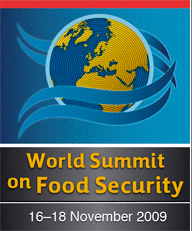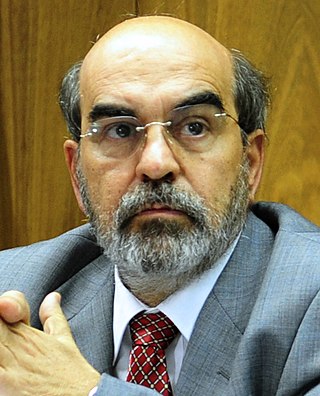
The Food and Agriculture Organization of the United Nations (FAO) is a specialized agency of the United Nations that leads international efforts to defeat hunger and improve nutrition and food security. Its Latin motto, fiat panis, translates to "let there be bread". It was founded on 16 October 1945.

In politics, humanitarian aid, and the social sciences, hunger is defined as a condition in which a person does not have the physical or financial capability to eat sufficient food to meet basic nutritional needs for a sustained period. In the field of hunger relief, the term hunger is used in a sense that goes beyond the common desire for food that all humans experience, also known as an appetite. The most extreme form of hunger, when malnutrition is widespread, and when people have started dying of starvation through lack of access to sufficient, nutritious food, leads to a declaration of famine.

Starvation is a severe deficiency in caloric energy intake, below the level needed to maintain an organism's life. It is the most extreme form of malnutrition. In humans, prolonged starvation can cause permanent organ damage and eventually, death. The term inanition refers to the symptoms and effects of starvation. Starvation by outside forces is a crime according to international criminal law and may also be used as a means of torture or execution.

Food security is the state of having reliable access to a sufficient quantity of affordable, nutritious food. The availability of food for people of any class, gender or religion is another element of food security. Similarly, household food security is considered to exist when all the members of a family, at all times, have access to enough food for an active, healthy life. Individuals who are food-secure do not live in hunger or fear of starvation. Food security includes resilience to future disruptions of food supply. Such a disruption could occur due to various risk factors such as droughts and floods, shipping disruptions, fuel shortages, economic instability, and wars. Food insecurity is the opposite of food security: a state where there is only limited or uncertain availability of suitable food.

Malnutrition occurs when an organism gets too few or too many nutrients, resulting in health problems. Specifically, it is a deficiency, excess, or imbalance of energy, protein and other nutrients which adversely affects the body's tissues and form.
The United Nations World Summit for Children was held in the United Nations Headquarters in New York City on 29–30 September, 1990. The summit had the then-largest-ever gathering of heads of state and government to commit to a set of goals to improve the well-being of children worldwide by the year 2000. It was the first time a UN conference had set a broad agenda for a wide range of goals in health, education, nutrition and human rights.
World Food Summits are convened by the Food and Agriculture Organization of the United Nations.
The Committee of 19 is a committee of students at Auburn University that direct the War on Hunger efforts on campus and in the local community. In 2004, Auburn University was chosen by the World Food Programme, an agency of the United Nations and the largest humanitarian organization in the world, to lead the first student-led efforts in the War on Hunger. The number 19 in the title is symbolic of the 19 cents per day that it takes the World Food Programme to feed a hungry child in the developing world. Today, that number is estimated to be closer to twenty-five cents. There are currently 22 members on the Committee of 19, representing various student organizations and the university's colleges and schools.
The year 2008 was declared the International Year of the Potato by the United Nations, noting that the potato is a staple food in the diet of the world's population, and affirming the need to focus world attention on the role that the potato can play in providing food security and eradicating poverty. Food and Agriculture Organization was invited to facilitate its implementation.
The International Union of Food Science and Technology (IUFoST) is the global scientific organization and voice for food science and technology representing more than 300,000 food scientists, engineers and technologists through its work in more than 100 countries. It is a voluntary, non-profit association of national food science organizations. IUFoST is the only elected scientific representative of Food Science and Technology in the International Science Council (ISC), elected by its peers across scientific disciplines. It is the only global representative of food science and technology to notable organizations such as the World Health Organization (WHO), Food and Agriculture Organization (FAO) of the United Nations, United Nations Development Programme and (UNDP), CODEX Alimentarius.

The right to food, and its variations, is a human right protecting the right of people to feed themselves in dignity, implying that sufficient food is available, that people have the means to access it, and that it adequately meets the individual's dietary needs. The right to food protects the right of all human beings to be free from hunger, food insecurity, and malnutrition. The right to food implies that governments only have an obligation to hand out enough free food to starving recipients to ensure subsistence, it does not imply a universal right to be fed. Also, if people are deprived of access to food for reasons beyond their control, for example, because they are in detention, in times of war or after natural disasters, the right requires the government to provide food directly.

The World Summit on Food Security took place in Rome, Italy between 16 and 18 November 2009. The decision to convene the summit was taken by the Council of the Food and Agriculture Organization of the United Nations (FAO) in June 2009, at the proposal of FAO Director-General Dr Jacques Diouf. Sixty Heads of State and Government and 192 ministers, from 182 countries and the European Community, attended the summit, which took place at FAO's headquarters.

José Graziano da Silva is a Brazilian American agronomist and writer. As a scholar, he has authored several books about the problems of agriculture in Brazil. Between 2003 and 2004, Graziano served in the Luiz Inácio Lula da Silva cabinet as Extraordinary Minister for Food Security, being responsible for implementing the Fome Zero program, which was a focal point of the Lula Administration's cash transfer program Bolsa Familia. On June 26, 2011, Graziano was elected director-general of the Food and Agriculture Organization (FAO), becoming the first Latin American ever to hold the position. After his first term from 1 January 2012 to 31 July 2015, Graziano da Silva was re-elected for a second 4 year-term during FAO's 39th Conference.

There were 735.1 million malnourished people in the world in 2022, a decrease of 58.3 million since 2005, despite the fact that the world already produces enough food to feed everyone and could feed more than that.
The Rome Declaration on World Food Security is a document adopted at the 1996 World Food Summit took place in Rome, Italy between 13 and 17 November 1996. The summit was organised by the Food and Agriculture Organization of the United Nations (FAO). The Declaration reaffirms the right of everyone to have access to safe and nutritious food consistent with the right to adequate food and the fundamental right of everyone to be free from hunger and pledges political will and common and national commitment to achieving food security for all and to an ongoing effort to eradicate hunger in all countries with an immediate view to reducing the number of undernourished people to half their present level no later than 2015. Therefore, the document has important significance in relation to Food security and the Right to food. Signatories commit to the implementation of the World Food Summit Plan of Action.
The Voluntary Guidelines to support the Progressive Realization of the Right to Adequate Food in the Context of National Food Security, also known as the Right to Food Guidelines, is a document adopted by the Food and Agriculture Organization of the United Nations in 2004, with the aim of guiding states to implement the right to food. It is not legally binding, but directed to states' obligations to the right to food under international law. In specific, it is directed towards States Parties to the International Covenant on Economic, Social and Cultural Rights (ICESCR) and to States that still have to ratify it.
The Universal Declaration on the Eradication of Hunger and Malnutrition was adopted on 16 November 1974, by governments who attended the 1974 World Food Conference that was convened under General Assembly resolution 3180 (XXVIII) of 17 December 1973. It was later endorsed by General Assembly resolution 3348 (XXIX), of 17 December 1974. This Declaration combined discussions of the international human right to adequate food and nutrition with an acknowledgement of the various economic and political issues that can affect the production and distribution of food related products. Within this Declaration, it is recognised that it is the common purpose of all nations to work together towards eliminating hunger and malnutrition. Further, the Declaration explains how the welfare of much of the world's population depends on their ability to adequately produce and distribute food. In doing so, it emphasises the need for the international community to develop a more adequate system to ensure that the right to food for all persons is recognised. The opening paragraph of the Declaration, which remains to be the most recited paragraph of the Declaration today, reads:
Every man, woman and child has the inalienable right to be free from hunger and malnutrition in order to develop fully and maintain their physical and mental faculties.
The Declaration on the Rights of Peasants is an UNGA resolution on human rights with "universal understanding", adopted by the United Nations in 2018. The resolution was passed by a vote of 121-8, with 54 members abstaining.

Sustainable Development Goal 2 aims to achieve "zero hunger". It is one of the 17 Sustainable Development Goals established by the United Nations in 2015. The official wording is: "End hunger, achieve food security and improved nutrition and promote sustainable agriculture". SDG 2 highlights the "complex inter-linkages between food security, nutrition, rural transformation and sustainable agriculture". According to the United Nations, there were up to 757 million people facing hunger in 2023 – one out of 11 people in the world, which accounts for slightly less than 10 percent of the world population. One in every nine people goes to bed hungry each night, including 20 million people currently at risk of famine in South Sudan, Somalia, Yemen and Nigeria.
The International Food Security Treaty (IFST) is a proposed covenant between nations aiming to place the human right of freedom from hunger under the protection of enforceable national and international laws.











